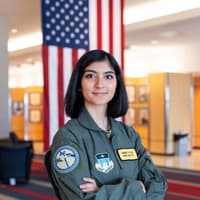Manmeet Pelia
Manmeet Pelia is an alumna of the 2021 CLS Punjabi Program hosted virtually by American Institute of Indian Studies (AIIS) in Chandigarh, India. Manmeet is a third-year electrical and computer engineering student at the United States Air Force Academy. After graduating, Manmeet plans to apply and participate in LEAP (Language Enabled Airmen Program) to continue to grow her language and cross-cultural communication skills for the U.S. Department of Defense. Manmeet hopes to one day serve as a researcher or test pilot in the space community using her Punjabi to foster diplomacy and cross-cultural collaboration.
Getting to Know Manmeet
I am a military brat that moved every three years. My father served 26 years in the U.S. Air Force. I grew up in California, England, New Jersey, Japan, Kansas, South Carolina, and Colorado. Traveling frequently at a young age taught me to find respite in new experiences and cultures. I viewed food and language as the keys to unlocking different cultures around the world. My best childhood memories were eating interesting delicacies like baby octopus in Japan, bugs in Thailand, and scorpions in China. I was always an adventurous eater. My favorite part about traveling was meeting different people and learning about their lifestyles. I’m very lucky to say I have friends around the world who have pushed me to become a better person. One difficult part about being a military brat is that while I was learning about different cultures around me, I lost connection to my own culture since I was never surrounded by a Punjabi community. This alienation pushed me to pursue the Critical Language Scholarship to not lose a dying part of my culture – its script and language.
Why Punjabi?
Learning Punjabi is such a delight. I strongly recommend learning it. One beautiful thing about the Indic languages is that they are very similar so learning Punjabi is a great gateway to the other languages like Hindi and Urdu. Another fact that I didn’t know until I joined CLS is that the United Nations ranks Punjabi as the 10th most prevalent language around the globe. It is the third most spoken language in Canada and second most spoken language in the United Kingdom. Economically, Punjab is a strong Indian state with abundant opportunities in trade, business, and travel. This positions the language as a strategic advantage in any career field.
Professionally, as a member of the profession of arms, knowing Punjabi will give me an advantage in diplomacy situations that require a deeper understanding of the language. On a personal level, I wanted to learn Punjabi because I was a heritage speaker and didn’t know the traditional script. Punjabi culture is also very important to me, so it made sense to continue an immersive study to preserve my culture and heritage.
Sharing CLS with the U.S. Air Force Community
The Critical Language Scholarship is a program that I will always sing praises about in my military community at the Air Force Academy. One thing I always emphasize is that CLS provides an immersive educational experience that no program in our language department can compete with. As members of the professions of arms, time is valuable and cadets do not have enough of it. Lack of time and the sheer work of learning a language are strong deterrents for cadets who want to learn. This excuse isn’t good enough for future soldiers to not be global citizens – we need culturally-conscious officers now more than ever. Sharing my personal experiences and growth within the program has helped cadets realize the value and fun in learning languages. Since participating in CLS, I have mentored over ten cadets to either apply to CLS or pursue other language/culture programs.
Favorite Memories
My teachers at AIIS did a wonderful job of bringing the culture into our own homes. Two other students in my Punjabi cohort lived in the same city as me and we were able to bond over our shared appreciation of Punjabi food, music, and language. My favorite memories include helping my classmate buy Indian groceries the day before our cooking class and visiting the Gurdwara with him where he got to practice playing the harmonium. Throughout my experience with CLS, I found myself becoming more confident in my abilities regardless of the mistakes I was making. I learned to stop fearing making mistakes and prioritize connecting with other Punjabi speakers.
Words of Advice
When picking a language, I recommend students pick a heritage language or language that they have a personal connection to because that will support a lifetime eagerness for learning and advancement. That passion and excitement will easily exude from your application. If you are interested in another language, I would emphasize the importance of fully developing/understanding the strategic advantage it has to your career, aspirations, and service to the United States.



